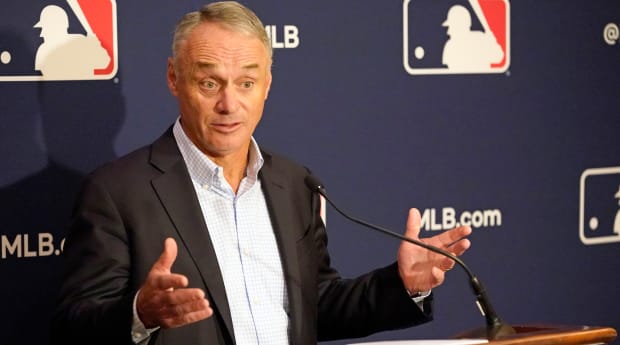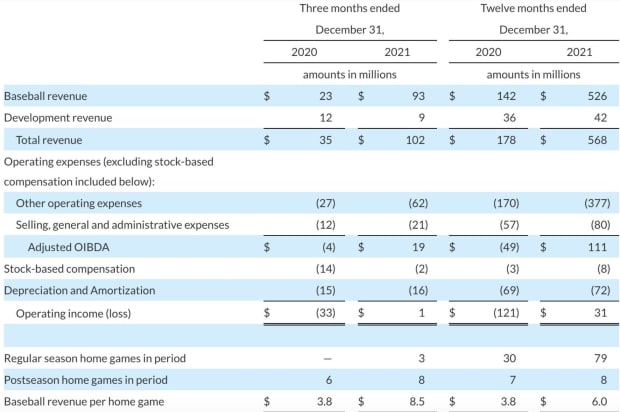First off, apologies for sending this newsletter out later than usual. I was waiting to see what happened in today’s bargaining session. For the first time, the two sides made some noticeable progress. According to multiple reports, they are nearing an agreement on the draft order/lottery, though it is not yet finalized.
MLB made a proposal on the draft, the players countered, and from there they went back and forth a few times, per The Athletic’s Evan Drellich. Also worth noting, Rob Manfred showed up! He hadn’t attended bargaining sessions in months, Chelsea Janes of The Washington Post reports, but he was there today. He met one on one with MLB union chief Tony Clark, though it’s unknown what they discussed.
The overall gap between the two sides remains wide, but at least it appears they are close on something. At this point, that has to be considered a good thing. They are meeting again tomorrow.
Now, onto the rest of the newsletter...

AP Photo/John Raoux
Just over two weeks ago, Rob Manfred held a press conference to spew misinformation about the MLB lockout. Among his nonsense, he said throughout the history of the game, he was “the only person who has made a labor agreement without a dispute…” two months into the lockout of his own creation.
Emma Baccellieri wrote in her brilliant translation of Manfred’s presser that the commissioner’s comments were “wildly, eye-roll-inducingly disingenuous.” Perhaps nothing Manfred said was more insincere than his assertion that owning a baseball team was a bad investment.
“We actually hired an investment banker, a really good one, actually, to look at that very issue,” Manfred said. “If you look at the purchase price of franchises, the cash that's put in during the period of ownership and then what they've sold for, historically the return on those investments is below what you’d get in the stock market, what you’d expect to get in the stock market, with a lot more risk.”
The factuality of Manfred’s statement cannot definitively be proved one way or the other because we don’t know what the stock market return for teams would be. As Emma wrote, “teams’ financial books are generally closed.”
However, the sentiment behind Manfred’s message was clear: Baseball teams are not as profitable as you’d think. The benevolent owners don’t make that much money from their franchises, but they own them anyway because they care about you, the fans.
So this morning it was rich—pun very much intended—when Eric Fisher of Sports Business reported the 2021 earnings for the Atlanta Braves.
The Braves Group consists of both the team and the Battery Atlanta—the development right next to Truist Park, which includes restaurants, stores and a music venue. The Braves made $526 million in baseball revenue and $42 million in revenue from the Battery. During the pandemic-shortened 2020 season, the team’s baseball revenue was just $93 million and the Battery revenue was $9 million. The Braves’ baseball profit of $104 million in ’21 is up from a $49 million loss in ’20; factor in the Battery, and the Braves made a $111 million profit last season after a $53 million loss in ’20.

Two things to note:
- The Braves are owned by Liberty Media, which, because it’s a publicly traded company, is required to report its earnings. The Blue Jays are owned by Rogers Communications, also a public company, but Canada does not require Rogers to report the Blue Jays’ specific financial information.
- Atlanta won the World Series, and putting a good team on the field, especially a true title contender, is typically going to be more profitable than fielding a rebuilding roster.
But even though we don’t know the finances for the other 29 franchises and even though we recognize that the World Series-winning Braves were almost certainly more profitable than many other teams, their earnings are still important because they reveal that owning baseball teams can be a lucrative business venture.
The earnings also suggest that competitive baseball teams are more profitable than those that have no shot at contention. Then again, considering all the revenue that small-market teams receive through revenue sharing, baseball franchises could be quite profitable for owners even if their teams stink and regardless of market size.
Want some more proof? As Tom Verducci writes in his column from this morning (more on this in the next section), “David Glass bought the Royals for $96 million in 2000. He sold them 19 years later for $1 billion. The Royals. The team that plays in the third smallest MLB market.”
Consider the context of Manfred’s claim: The press conference was held amid labor negotiations that clearly weren’t going the way MLB had hoped or expected. The implication is that the owners cannot afford to give the players the amount of money the union has proposed.
So why would he say that baseball teams are bad investments? Why would he say something that before was misleading and now is, at least in some cases, demonstrably false?
The owners realize that their best chance to break the union’s solidarity is to convince baseball-hungry fans that the league is doing all it can to start the season on time, but it can’t because greedy players are being unreasonable. Manfred, as commissioner, is tasked with the persuading.
However, it’s clear now, if it wasn’t already, that the owners can afford to give the players more money and that they aren’t doing all that they can to start the season on time.
It’s clear that it’s not the players, but the greedy owners who are being unreasonable.
Have any questions for our team? Send a note to mlb@si.com.
1. THE OPENER
“The lockout of 1990, like the two lockouts that preceded it, was settled without missing a regular season game. This one, the first since then, is more ominous because there are more issues of disagreement and because baseball has lost ground in a fast-changing, ever-expanding entertainment landscape.”
That’s Tom Verducci in his column about this weekend’s negotiations and the most pressing issues that stand in the way of an agreement. You can read his entire piece below:
This Is MLB’s Most Important Weekend in Two Decades by Tom Verducci
2. ICYMI
Baseball’s Greatest Threat Isn’t the Lockout by Tom Verducci
The sport’s place in popular culture and the entertainment landscape is in danger not because of its economic structure, but because of how it is played.
Andrew Miller Explains Key Issues for Union in MLB Lockout by Emma Baccellieri
The veteran reliever is one of the eight players on the union’s executive subcommittee. He spoke with SI about CBA negotiations.
‘Sex and the City’ and a Baseball Mystery by Emma Baccellieri
The iconic show’s reboot sent me down the perfect rabbit hole during the MLB lockout. Here’s what I found.
Complete Guide to the College Baseball Season by Claire Kuwana
Looking to get your baseball fix during the MLB lockout? Here’s a quick guide to the 2022 NCAA season.
Also, in today’s SI:AM Newsletter, I spoke with Josh Rosenblat about why Opening Day is probably going to be delayed. You can find our conversation here.
3. WORTH NOTING from Tom Verducci
Strategy is always a part of negotiations. A reminder occurred this week during unfruitful negotiations between the owners and the players as it relates to an expanded postseason.
The players have not signed off on a 14-team postseason, even though it means more money for them and more players with a chance to play in the World Series. They know owners already have sold some TV inventory for an expanded postseason for about $100 million. It is a chip with value.
This week owners concluded not only were players not treating Monday as a firm deadline to preserve a March 31 Opening Day, but also that the players could hold approval for an expanded postseason as part of a final settlement, which could include arguing for lost pay if games are lost. So owners doubled down on the deadline and their position that games and pay cannot be retrieved if the two sides blow through the deadline.
By doing do, owners tried to inject needed urgency in the slow-moving talks. They also narrowed their position. As commissioner Rob Manfred said, losing regular season games would be disastrous for the sport. No matter the firmness of the deadline, both sides are on the clock.
4. TRIVIA! from Matt Martell
Before we get into this week’s question, here is the answer to the one I asked last Friday.
Last Week’s Question: Following Zimmerman’s retirement, there are three active players who have spent their entire careers of at least 15 seasons with only one team. Who are they?
Answer: Yadier Molina (18), Adam Wainwright (17), Joey Votto (15)
This Week’s Question: Who are the seven active pitchers with at least 2,000 career strikeouts?
5. The Closer from Emma Baccellieri
At a time when baseball headlines might feel universally dreary—don’t forget that “baseball” is not limited to Major League Baseball. College baseball (and softball!) have gotten off to supremely fun starts. NPB in Japan is in its version of spring training and will begin the regular season in a few weeks. It’s a frustrating point in MLB, yes. But remember that baseball is a much broader idea than that.







